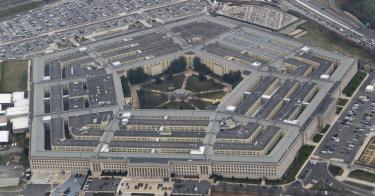The COVID-19 coronavirus pandemic is affecting the entire global economy, and the defense industry is no exception. But defense contractors and the Pentagon are working hard to minimize the disruption to research, development, and procurement.
While many businesses around the country are closed due to states’ stay-at-home orders, the defense industry is, for the most part, still at work.
At the federal level, defense contractors are deemed “critical infrastructure” in the Department of Homeland Security’s guidance on essential, critical infrastructure workers. The Pentagon is urging the defense industry to continue doing business.
Undersecretary of Defense for Acquisition and Sustainment Ellen Lord published a memo on March 20 clarifying that defense industry firms are “expected to maintain their normal work schedules,” saying, “We need your support and dedication in these trying times to ensure the security of this Nation.”
But it’s primarily state and local governments, not the federal government, that have the authority to determine who is exempt from shutdown orders.
Fortunately, it appears states have mostly adopted the federal government’s guidance about critical infrastructure in devising their stay-at-home orders. So, for the time being at least, the defense industry is not being forced at the state level to shut down.
Still, defense contractors are by no means shielded from the impact of the coronavirus. Factories depend on healthy workers.
Some companies have decided to shut down production of their own accord. For example, Boeing shut down its Washington state plants on March 23, halting work on the KC-46A tanker and the P-8 maritime patrol aircraft.
What likely drove that was that 95 of Boeing’s Washington state employees had tested positive for the coronavirus as of April 6.
The company will begin “a safe and orderly restart of limited operations” this week, but will only send about 8% of employees back to work, specifically on its defense programs.
Other companies are trying to figure out how to continue operations even as some of their workers are falling ill.
Huntington Ingalls Newport News Shipbuilding, which builds nuclear submarines and aircraft carriers for the Navy, has 20 coronavirus cases, but for the time being at least is staying open. That’s good news for America, because shipbuilding plans are tightly synchronized, and a delay now would have ripple effects for years.
The coronavirus is forcing companies to be innovative, while at the same time taking into consideration employee concerns. The shipyard is now requiring all employees to wear face coverings, and one of its shipbuilding teams is making masks out of Newport News T-shirts.
Facilities are frequently cleaned, and workers are asked to maintain social distancing—staying six feet away from each other at all times—in the workplace.
A letter from the shipyard’s president reminds employees that “liberal leave is available to everyone, and you can choose to stay home if you feel unsafe or uncomfortable coming to work.”
Regardless of a pandemic, the country will continue to need to defend itself, and defense companies are making plans based on this continued demand for their products.
Lockheed Martin is not only continuing production of the F-35 at its Fort Worth plant in Texas, but it’s also hiring at least 700 new workers there, even as many other industries are forced to lay off their employees.
The COVID-19 pandemic is injecting uncertainty into the defense industry, and there is no clear “right way” for companies to address the situation or to interpret federal and state guidance.
The Pentagon’s direction to defense contractors—to continue doing business as much as possible—is not legally binding, but it also cannot be ignored. Still, this direction has to be balanced against worker safety.
No company wants to put its workers at risk of contracting the disease, and employees are wary of being at work when most businesses in their states are closed and most people are sheltering at home.
Like the pandemic itself, the business environment for defense contractors is volatile, and neither the Pentagon, nor states, nor company leadership can know how the situation will develop in coming weeks.
The industry will likely face problems with supply chains, loss of skilled labor to the commercial sector, and production delays.
Only time will tell how all this plays out, and whether current and future mitigation efforts by industry and government make a difference.
This piece originally appeared in The Daily Signal



